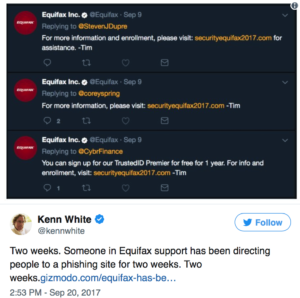I would think the folks at Equifax are not having a great time lately. I don’t know for sure, but like the people at Volkswagen two years ago, and the folks at Lululemon just about any time their founder opens his mouth, I would think the days feel just a little longer lately.
Which is kind of sad because they needn’t. The truth is, companies and CEOs do stupid things all the time. They leak info, make false statements, mess up customer service, forget about paying taxes, hire children to make their products, kill their workers, recall their products, drain aquifers, pollute large (and small) bodies of water, and so on.
Most of these companies, I’m betting, have a bunch of risk management people focused on dealing with the aftermath of such idiocy, intentional or otherwise. And I’m betting those risk management folks have a giant binder called the Business Continuity Plan. And in that giant binder is a tab called the Crisis Communications Plan. If this is you and your crisis communication plan tab is empty or absent, you will want to get on it.
Now in that Crisis Communications plan there are pro forma statements, speed dial lists to the lawyers, the PR firm and all the technical people who get up in the night to fix stuff. If you’re really on top of your game you have some dark web pages, management call trees, a little bit of budget and all kinds of contingency plans about weather and power issues. But I will put money on whether you have an internal crisis communications plan.
I don’t mean the part where you tell your employees to stay home in a blizzard or don’t talk to the media while the CEO is perp-walked; I mean the kind where you help them have difficult conversations with customers.
Would you like to be the minimum wage shop clerk dealing with a customer who is demanding a refund because the CEO has said regrettable things? What’s worse, that poor clerk can do nothing other than take the wrath and try to figure out how to code the refund when there is no check box for “CEO is mean.”
Videos like this mea culpa from Chip Wilson don’t actually help.
https://youtu.be/jeFMeBtNRp8
Sure, he’s apologetic and let’s give him props for acknowledging his front-line staff, but this is not really making anything better. This does not give the clerk or the call centre rep or the sales person any tools to share that regret, acknowledge the damage and move to a more constructive conversation. It just makes them a human shield when the pile of poop meets the wind machine.
What we need are templates we can pull together really fast when something dumb happens. Equifax is a case study in what happens when we don’t do this. I don’t know for sure, but I’m guessing the reason it took six weeks from the discovery of the breach (which had been going on for a bunch of weeks prior) was a circling of the legal wagons while they wrung their hands and figured out what to do.
Then, of course, because they didn’t have a dark web page they could populate with helpful things and take live, someone helpfully put up a phishing page just to show them up a second time.
Let’s compare to how Slack handled an almost total shutdown of its service a little under two years ago: Granted, when they dropped the ball, pretty much all of their biggest users knew it instantly, and Slackers are not the sort to take it lying down.
But what their SlackHQ team did was stop going to meetings and start getting on Twitter, sending 2,300 replies and tweets in just a few hours, picking up more than 3,000 new followers. How did they do this? I’m going to say they not only had a detailed plan, but they also had a bunch of pre-written messages, in their usual slightly cheeky tone, the team could grab as needed. I will further wager they told the team to use their judgement in responding, as opposed to sending comments up some tedious escalation queue.
If you’re wondering what it looks like when the front line is set up to have the hard conversation in the difficult circumstance, it looks a lot like adding 3,300 new Twitter followers on the worst day you’ve ever had.
The United Airlines crew that made a regrettable decision about “re-accommodating” a passenger might have done a little better in the presence of an overbooking script (they might not have, but the odds of a better response improve dramatically). Similarly, there is no shortage of examples when it comes to great and terrible responses to bad brand things, but the difference between BP’s CEO complaining that he’d like his life back while his company polluted the Gulf of Mexico…
… and Maple Leaf Foods’ Michael McCain stepping up to own a listeria crisis is nothing more than preparation.
We can’t predict the Dance Apologetica we’ll need to perform but we can paint a few steps on the floor and practice them over and over until the right thing is the reflexive thing, and we can make sure everyone from top to bottom knows how to get the dance started, and those of us in the communications chair, have the tools to keep calling the dance until everyone is answered.
Related Posts (or not)
A Well-Managed Crisis Ticks the Humanity Box
Flying Balls of Cat Puke: How Good Values Help in Bad Times
by Elizabeth Williams
I help companies have better conversations with employees and customers.
Drop me a line at ewilliams@candlerchase.com

Leave a Reply
You must be logged in to post a comment.